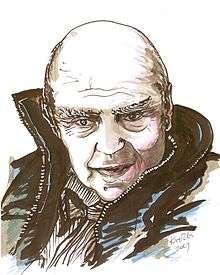Jarosław Marek Rymkiewicz
| Jarosław Marek Rymkiewicz | |
|---|---|
|
Rymkiewicz portrait | |
| Born |
13 July 1935 (age 80) Warsaw |
| Occupation | writer, critic |
| Nationality | Polish |
| Ethnicity | German-Polish-Lithuanian-Tatar |
| Citizenship | Polish |
Jarosław Marek Rymkiewicz (Jarosław Marek Szulc; born 13 July 1935, in Warsaw) is a Polish poet, essayist, dramatist and literary critic. He is the son of Władysław Szulc, of German and Polish origin, who changed his last name to Rymkiewicz (a writer) and of Hanna Baranowska, of German and Tatar origin (a physician).
As a poet, he is influenced by the traditions of classicism and the baroque. He has received multiple prizes for his novels, essays, and translations, including the Kościelski Prize (1967), S. Vincenz Prize (1985), and Polish PEN Club Prize. His volume of poetry Zachód słońca w Milanówku won the prestigious Nike Award in 2003.
Although Rymkiewicz is primarily a poet, he is better known as the author of two influential novels that contributed to the two most important debates of the 1980s: that involving martial law (1981) and Polish-Jewish relations. His novel Rozmowy polskie latem, 1983 (Polish Conversations in Summer 1983) discusses the meaning of being Polish and the preoccupation with achieving independence. Rymkiewicz’s second novel, entitled Umschlagplatz (1988), had a greater impact. Instytut Literacki, the largest Polish émigré publishing house, originally published the novel in Paris in 1988 as it could not appear in communist Poland. It was reprinted a few times by underground publishing houses in Poland but officially appeared only in 1992 after the communists lost power in 1989. It was translated into French (1989), German (1993), and English (1994).
The novel focuses on the symbolic meaning of Umschlagplatz, which denotes a small square in German-occupied Warsaw (1939–1945) from which the Germans sent more than 300,000 Jews to their deaths, and thus a place which "may well be the only place of its kind" in the world. (p. 7, Umschlagplatz). He attempts to understand the implication of the existence of such a place for the contemporary Warsaw and the contemporary Poles. It took Rymkiewicz two years of study and research to create a detailed plan of the square. He concluded that Germans introduced the name Umschlagplatz sometime before July 1942; in pre-war Poland the place was called Transfer Square and was the center for the Jewish wholesale trade.
As an essayist, Rymkiewicz concentrates on Polish history (the partition period, World War II).
He supports the conservative Law and Justice political party.
Bibliography
Poetry
Each year links to its corresponding "[year] in poetry" article:
- 1957: Konwencje ("Conventions")[1]
- 1983: Ulica Mandelsztama ("Mandelstam Street")[1]
- 1984: Mogila Ordona ("Ordon's Grave")[1]
- 1993: Moje dzielo posmiertne ("My Posthumous Works") Krakow: Znak[1]
- 1999: Znak niejasny, baśń półżywa ("The Unclear sign, a Half-living Legend"), Warsaw: Państwowy Instytut Wydawniczy[1]
- 2002: Zachód słońca w Milanówku ("Sunset in Milanówek"), Warsaw: Sic![1]
- 2006: Do widzenia gawrony ("Good-bye, Rooks"), Warsaw: Sic![1]
Prose
Each year links to its corresponding "[year] in literature" article:
Books of Essays
- 1967: Czym jest klasycyzm ("What is Classicism?")[1]
- 1968: Mysli rozne o ogrodach ("Various Thoughts about Gardens")[1]
- 1977: Aleksander Fredro jest w zlym humorze ("Aleksander Fredro is in a Bad Mood")[1]
- 1982: Juliusz Slowacki pyta o gozine ("Juliusz Slowacki Inquires about the Time"). Warsaw: Czytelnik[1]
- 1983: Wielki Ksiaze ("Archduke"). Warsaw: PIW[1]
- 1987: Zmut Warsaw: Niezalezna Oficyna Wydawnicza[1]
- 1989: Baket[1]
- 1994: Kilka szczegolow ("A Few Particulars"). Cracow: Arcana[1]
- 1996: Do Snowia i dalej ("To Snow and Beyond"). Cracow: Arcana[1]
- 2001: Lesmian. Encyklopedia ("Lesmian. Encyklopedia"). Warsaw: Sic![1]
- 2004: Słowacki. Encyklopedia ("Słowacki: The Encyclopaedia"), Warsaw: Sic![1]
- 2007: Wieszanie ("Hanging"), Warszawa: Sic![1]
- 2008: Kinderszenen, Warszawa: Sic![1]
Novels
- 1983: Rozmowy polskie latem roku 1983 ("Polish Conversations during 1983 Summer")[1]
- 1988: Umschlagplatz[1]
Comedies
- 1970: Krol Miesopust ("The King of Meat")[1]
- 1971: Porwanie Europy ("The Abduction of Europe")[1]
- 1972: Kochankowie pieklo ("The Lovers of Hell")[1]
- 1973: Niebianskie bliznieta ("The Heavenly Twins")[1]
- 1979: Dwor nad Narwia ("Country House on the Narwa")[1]
Further reading
- Joanna Michlic. "Umschlagplatz". [In:] Polin. A Journal of Polish-Jewish Studies 6(1991): pp. 333–338.
- Katarzyna Zechenter. "Marek Rymkiewicz". [In:] Holocaust Literature. An Encyclopedia of Writers and Their Work. Vol.2. Ed. S. Lillian Kremer. Routledge 2003, pp. 1063–1067. ISBN 0-415-92984-9.
References
External links
- Instytut Książki Web page on Rymkiewicz
|
